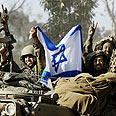
The power of silence
Haim Broida says Lebanon lesson learned: Army’s silence during Gaza op conveys strength
Since the start of the Gaza campaign, we can register one prominent IDF victory that has nothing to do with combat doctrine or battlefield achievements. The almost complete silence, adopted first of all by Chief of Staff Gabi Ashkenazi, vis-à-vis the media is reflected upon the IDF’s entire chain of command. Without realizing it, this conveys a sense of strength and affects our enemies too.
The IDF’s ability, in the current campaign, to control the “chatter” that we saw in the Second Lebanon War is one of the main lessons drawn by the IDF. In most cases, silence produces power.
During the war in Lebanon, we heard, almost hourly, some kind of opinion, commentary, or criticism from a “senior officer” sitting at the command bunker or talking from the battlefield. The damage was critical. Information was leaking constantly and Hizbullah knew at almost any point in time about IDF troops’ level of motivation, not to mention future targets.
This phenomenon disappeared in the current campaign. The threats unleashed by Hassan Nasrallah from his bunker in Lebanon attest, more than anything else, to growing distress and weakness, compared to his measured speeches during the Lebanon War. At that time, all of us wanted to listen to him and granted extra-importance to commentary about him, to the point of analyzing his body language.
There should be no doubt about it: IDF troops on the battlefield are aware of the mood on the home front. We know that our fighters in Gaza are able to listen to Israel radio stations. All they need to do is use a radio at one of the deserted homes or vehicles they encounter in Gaza in order to hear what’s being said around here, and this has an effect. The testimonials of troops in the Second Lebanon War made it clear that they knew what the home front was thinking, and this certainly did not provide them with any moral support or a backwind.
Politicians also silent
We’re not used to it, but it appears that the politicians are silent too. A sense of conservatism is in the air, as if someone controls the mouths of our elected officials. There is almost no doubt that the silence imposed on our military is backed by a sweeping directive on the part of the army chief. Perhaps it is even accompanied with an explicit threat to punish anyone who violates this order, regardless of their rank.
At certain junctions, silence and the avoidance of exaggerated passion convey strength. The current campaign is one of those junctions.
Public relations are a supreme value when it comes to conveying messages to the public and to the world; however, PR is profession. Not everyone is gifted with the skills required of a PR professional. Current IDF Spokesman Avi Benayahu is closely familiar with the media world. After all, he comes from there. At this time he is the obstacle that faces the almost inhumane pressure exerted by all media outlets, both in Israel and abroad, in an effort to end the army chief’s silence and allow greater access to military information.
As the campaign continues, Benayahu will have to weigh the national interest vis-à-vis the comradeship of his fellow journalists. This is no easy task. Hamas and observers in Arab states are closely scrutinizing us. One sentence uttered today can lose its meaning the next day. In this campaign of psychological warfare, the silence of our military officials, for the time being, constitutes a winning PR strategy.
Haim Broida is a journalist










